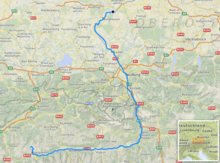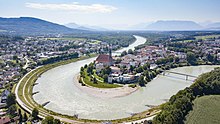| This article includes a list of general references, but it lacks sufficient corresponding inline citations. Please help to improve this article by introducing more precise citations. (May 2012) (Learn how and when to remove this message) |
| Salzach | |
|---|---|
 Salzach in Salzburg, Austria Salzach in Salzburg, Austria | |
 Salzach location Salzach location | |
| Location | |
| Countries | Austria and Germany |
| Physical characteristics | |
| Source | |
| • location | Kitzbühel Alps |
| Mouth | |
| • location | Inn |
| • coordinates | 48°12′24″N 12°55′46″E / 48.20667°N 12.92944°E / 48.20667; 12.92944 |
| Length | 227.3 km (141.2 mi) |
| Basin size | 6,829 km (2,637 sq mi) |
| Discharge | |
| • average | 251 m/s (8,900 cu ft/s) |
| Basin features | |
| Progression | Inn→ Danube→ Black Sea |
The Salzach (Austrian: ; German: [ˈzaltsax]) is a river in Austria and Germany. It is 227 kilometres (141 mi) in length and is a right tributary of the Inn, which eventually joins the Danube. Its drainage basin of 6,829 km (2,637 sq mi) comprises large parts of the Northern Limestone and Central Eastern Alps. 83% of its drainage basin (5,643 km (2,179 sq mi)) lies in Austria, the remainder in Germany (Bavaria). Its largest tributaries are Lammer, Berchtesgadener Ache, Saalach, Sur and Götzinger Achen.
Etymology

The river's name is derived from the German word Salz "salt" and Aach. Until the 19th century, shipping of salt down the Salzach was an important part of the local economy. The shipping ended when the parallel Salzburg-Tyrol Railway line replaced the old transport system.
Course
The Salzach is the main river in the Austrian state of Salzburg. The source is located on the edge of the Kitzbühel Alps near Krimml in the western Pinzgau region. Its headstreams drain several alpine pastures at around 2,300 metres (7,500 ft) (metres above the Adriatic), between Krimml and the Tyrolean state border, 3–5 kilometres (2–3 mi) north of the Gerlos Pass on the slopes of the Salzachgeier (2,466 m (8,091 ft)) and the nearby Schwebenkopf peak 2,354 m (7,723 ft)).
From here, it runs eastwards through a large valley via Bruck south of Lake Zell to Schwarzach im Pongau. It then turns northwards and passes Sankt Johann im Pongau. North of here, the Salzach forms the narrow Salzachöfen Gorge between the Berchtesgaden Alps and the Tennen Mountains and before flowing to Hallein and the city of Salzburg.

From the junction with its Saalach tributary in the northern Salzburg basin, the Salzach forms the border between Bavaria, Germany and the Austrian states of Salzburg and Upper Austria for almost 70 kilometres (43 mi). Cities on the banks in this lower section include Laufen and its sister town Oberndorf bei Salzburg, Tittmoning, and Burghausen. All these towns have border crossings.

The river finally empties into the Inn in Haiming between Burghausen and Braunau.
Tributaries
Upper and lower reaches: Putzengraben [ceb; cv], Trattenbach [ceb; de; sv] and Dürnbach [ceb; sv] from the Kitzbühel Alps, Krimmler Ache, Obersulzbach [ceb; de; fr; sv], Untersulzbach [ceb; de; fr; sv], Habach [ceb; sv], Hollersbach [ceb; sv], Felberbach [ceb; sv], Stubache [ceb; de; sv], Kapruner Ache [ceb; de; sv] from the High Tauern, Pinzga from Lake Zell, Fuscher Ache, Rauriser Ache [ceb; de; sv] from the High Tauern, Dientener Bach [ceb; sv] from the Salzburg Slate Alps, Gasteiner Ache [bar; ceb; da; de; fr; sv], Großarlbach [da; ceb; de; sv], Kleinarlbach [bar; ceb; de; sv] from the High Tauern, Fritzbach [ceb; da; de; sv] from the Dachstein Massif [de; fr; pl; ro; ru], Mühlbach [ceb; sv] and Blühnbach [ceb; sv] from the Hochkönig.
Lower reaches: Lammer from the east, Torrener Bach [ceb; cv; Torrenerbach] (in the Blunau Valley [ceb; de; sv]) from the Berchtesgaden Alps, Taugl [ceb; de; sv] and Almbach from the Hintersee [bar; ceb; de; sv], both from the Osterhorn Group, Königsseer Ache from the Königssee, Kehlbach [de], Fischach from the lake Wallersee, Klausbach, Saalach the largest tributaries, Sur and Götzinger Achen on the Bavarian side, Oichten near Oberndorf and Moosach in the Salzburg-Upper Austrian border region.
Hydroelectric power plants
Currently, there are 12 hydroelectric power plants on the Salzach. The power plants are listed beginning at the headwaters:
| Dam | Nameplate capacity (MW) | Annual generation (Mio. kwh) |
|---|---|---|
| Schwarzach | 120 | 482 |
| Wallnerau | 13 | 38 |
| St. Veit | 16 | 67 |
| St. Johann | 16 | 71 |
| Urreiting | 16 | 76 |
| Bischofshofen | 16 | 70 |
| Kreuzbergmaut | 18 | 80 |
| Werfen-Pfarrwerfen | 16 | 81 |
| Gamp | 8 | 53 |
| Sohlstufe Hallein | 16 | 81 |
| Urstein | 22 | 120 |
| Sohlstufe Lehen | 13 | 81 |
Photos
-
 Salzach in Salzburg
Salzach in Salzburg
-
 Salzach in Salzburg
Salzach in Salzburg
-
Salzach between Hallein and Salzburg
-
Salzach between Tenneck and Pass Lueg
-
Salzach near Pfarrwerfen
-
 "Staatsbrücke" bridge over Salzach in Salzburg
"Staatsbrücke" bridge over Salzach in Salzburg
See also
Sources
- Österreichisches Bundesministerium für Land- und Forstwirtschaft, Umwelt und Wasserwirtschaft: Die Salzach - ein Fluss bewegt! (PDF, 7,94 MB)
- Norbert Winding und Dieter Vogel (Hrsg.): Die Salzach. Wildfluss in der Kulturlandschaft. Verlag Kiebitz Buch, Vilsbiburg 2003, ISBN 3-9807800-1-5
References
- ^ Complete table of the Bavarian Waterbody Register by the Bavarian State Office for the Environment (xls, 10.3 MB)
- ^ "Die Salzach" (in German). Verbund. Retrieved 2016-09-03.
- "Kraftwerk Gamp" (in German). Salzburg AG. Retrieved 2016-09-06.
- "Kraftwerk Sohlstufe Hallein" (in German). Salzburg AG. Retrieved 2016-09-06.
- "Kraftwerk Urstein" (in German). Salzburg AG. Retrieved 2016-09-06.
- "Kraftwerk Sohlstufe Lehen" (in German). Salzburg AG. Retrieved 2016-09-09.